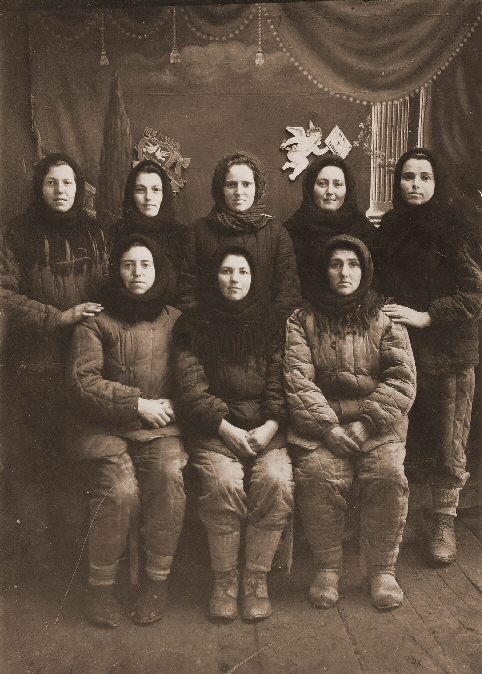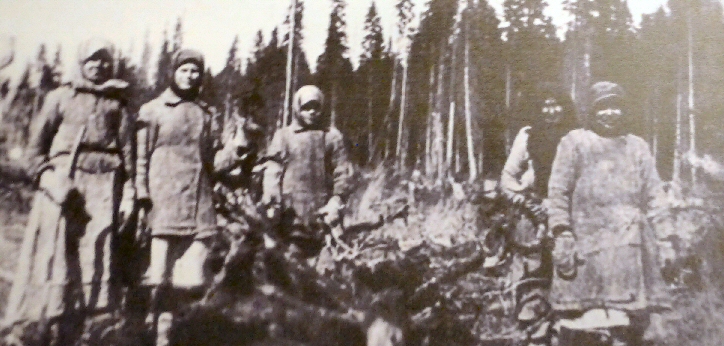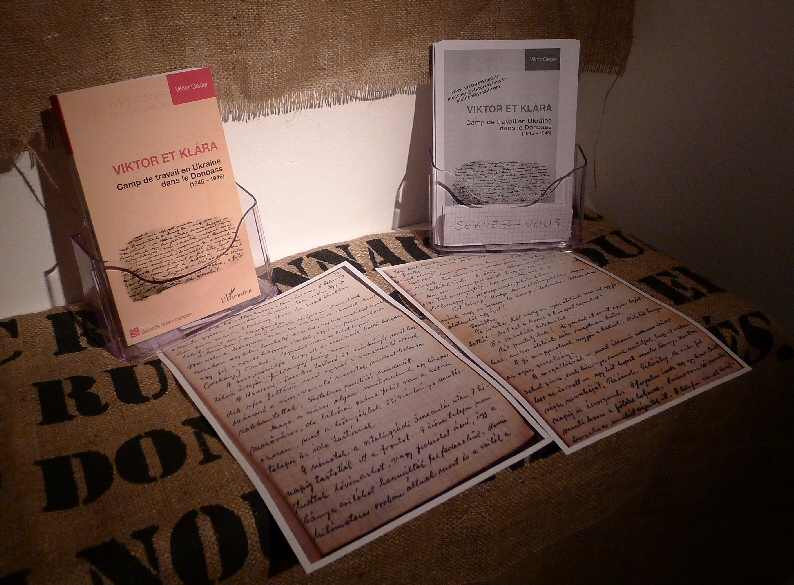Viktor and Klára
"Viktor et Klára" in Wikipedia
The Viktor Geiger's book is mentioned in the bibliography of a Wikipedia page devoted to "Forced labor of Hungarians in the Soviet Union".
This page has been translated in French, Hungarian, and others languages.
"Sous un ciel étranger" exhibition
Viktor's book was present in the exhibition "Sous un ciel étranger ..." dedicated to Forced labor of Hungarians in the Soviet Union, in the Hungarian Cultural Center in Paris (92 Rue Bonaparte), from 9th September to 13th October 2016.
Thank you to Mr János Havasi, the director of the cultural center, for exposing this book and allow us to publish the photos below.








The book "Viktor et Klára"

About the story
Transylvania, September 1944. The German army withdraws. The Soviet army arrives and deports Viktor, Klára and thousands of others from the region to participate in the rebuilding of the USSR as it is in ruins.
Viktor is married with two children, Klára is married but has no children. They don’t know it yet but their fates are linked. A rare and poignant testimony which is personal as well as historical. An extraordinary insight into Communism in Stalin’s time. The author describes the everyday life of a Soviet labour camp in detail using black humour but never giving in to hatred.
During these years of suffering, 1945 and 1946 in the Donbass, Ukraine, they are likely to succumb to disease, hunger, cold and despair.
Viktor survives the misery thanks to the support and friendship of his companions and his love for Klára.
This story, translated from Hungarian into French by his granddaughter, was written by Viktor after his return in 1947 from his memoires written in secret during his deportation.
About the author.
Viktor Geiger was born in 1902 in Transylvania into a wealthy Hungarian Catholic family. He had two daughters. He had various jobs including accountant, notary clerk and manager of a business.
Viktor always lived in Transylvania, where he died in 1983.
The context of the story
Little is known or recorded about the lives of ordinary Eastern Europeans at end of WW2. The German army with its allies invaded the Soviet Union doing a lot of damage but failing to take the big cities. The withdrawal began in 1944. The Red Army drove the invaders back but in retreat the German soldiers destroyed many things including the transport infrastructure. The Soviet army was in disarray. In the Ukraine (annexed by the USSR in 1922) all inhabitants who remained there during the time of the German occupation were considered German supporters and, therefore, traitors.
Tens of thousands of Ukrainians enlisted in the German army to fight the Russians.
All of these were sentenced to two years hard labour and the Ukraine became a huge prison. The Ukrainian prisoners were separated from the rest and watched more closely. They were treated more harshly than German prisoners. Typhus was transmitted by lice and caused many deaths. The access to many coal mines in the Donbass which had been destroyed by the Germans during their withdrawal, had to be reopened to provide energy to rebuild the country. The free Ukrainian workforce was not sufficient. The Red Army searched the liberated countries of Hungary, Romania, Czechoslovakia and Poland for more manpower. Tens of thousands of people were sent to the Ukrainian labour camps in 1945. They were often taken because their names sounded German.
This was the case for Viktor Geiger. He was there for two years and his story describes firstly life in a labour camp in Krasnyi Luch, a coal mining region 100 km east of Donetsk. This true story gives us the opportunity to discover the Communist regime under Stalin.
After a year he was moved to a huge foundry at Druzhkivka, 80km north of Donetsk. Here the full horror of the labour camps is revealed first hand. Escapes, punishment, fatal accidents, weddings, funerals, alcoholism, fights, hunger and madness are all present in this emotional account.
At the end of 1946 some prisoners, the weak, the ill and some pregnant women, were repatriated by train from Kramatorsk, 30 km north of Druzhkivka. At this time Viktor became a translator in the hope he would not return to the camps.
Viktor and Klara returned to Transylvania in early 1947.
How to buy this book
This book is available only in French.
Available to order in any bookshop.
Edition: L'Harmattan
Author: Viktor Geiger
Title: Viktor et Klara
You can also order it from the publisher's website, L'Harmattan.
Or order it from the usual online websites, Amazon.fr, Amazon.co.uk, Amazon.de, FNAC, etc ...
Collection "Mémoires du XXe siècle" (Memories of the twentieth century)
For those interested in historical accounts of the twentieth century, the publisher L'Harmattan offers a hundred books in this collection "Memories of the twentieth century" and some works relating to the nineteenth century.




